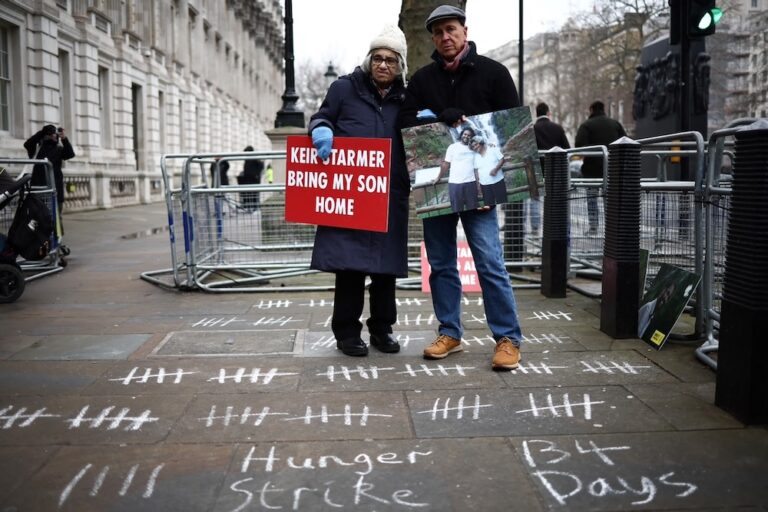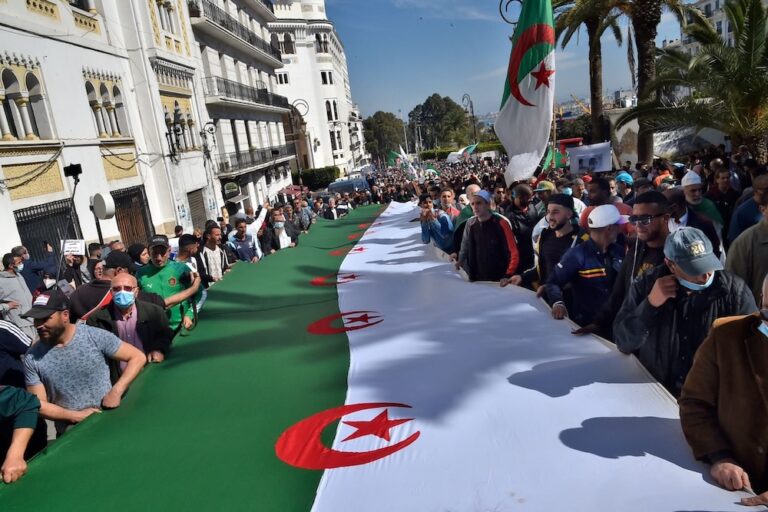A lack of accountability for recent killings has sparked transnational protests and strikes by feminist groups in the region.
This statement was originally published on gc4hr.org on 26 July 2022.
The influx of femicides in June 2022, committed mostly by women’s partners, sparked public outrage throughout the region by feminist groups. The murders of Egyptian university student, Nayera Ashraf (21 years old), and Jordanian university student, Iman Rashid (21 years old), gained wide public attention after both were brutally killed at their university campuses by men for simply refusing their advances. Although femicide is nothing new, these murders were different as they were committed in the public sphere rather than in the privacy of the home. Along with Ashraf and Rashid, the other women killed in June included Egyptian media figure Shaima Gamal, Lubna Mansour, and Raneen Sal’ous. And earlier this month, a man in Ramtha, Jordan beat his two daughters to death who were only 9 and 12 years old and a Jordanian woman was stabbed by her husband outside of a courthouse in Karak, Jordan. These murders led to a regional strike led by feminist groups calling on women to not attend work on 6 July 2022 in order to show solidarity with those murdered. Feminist groups also organised protests throughout the region calling for political action against the violence including in Beirut, Tunis, and Amman.
In Amman, protesters gathered outside the Parliament building on the same day holding signs reading, ‘Solidarity Across the Border, Stop Killing Women’ and listing victims’ names with their stories. The silent protest was organised by Takatoat, a Jordanian feminist collective group, which asked participants to wear all black in commemoration of the women whose lives had been taken. Leading the protest, Banan Abuzaineideen described the protest’s message to the Gulf Centre for Human Rights (GCHR), “Perpetrators think they have the right to end our lives and not be held accountable. We choose to stand here calling out the systematic violence taking place against women in private and public spaces, which is a result of misogyny.”
The lack of accountability and consequences for murders committed privately within the home has led to perpetrators not being fearful of killing women in broad daylight. A Jordanian woman explained to GCHR that these ongoing murders show how the law is failing women, “We are protesting today because, like many other places in the region, there is nothing else we can do. We want the laws to change and for women to be protected, but we know that women will continue being killed.”
Rana Al-Husseini, a women’s rights activist and journalist in Jordan, shared with Middle East Eye that it is likely the killer of Iman Rashid was influenced by the public stabbing of Nayera Ashraf due to similarities of their deaths. For that reason, Husseini explained, “People need to know that if they commit a crime they will be punished.”
Al-Husseini has been outspoken against ‘honor crimes’ in Jordan, which is when a woman or girl is killed by a family member for “tarnishing” the families’ reputation due to “immoral behavior”. She has also been outspoken against Jordan’s Penal Code, which allows a family member to waive their legal rights when another family member commits a crime. Al-Husseini finds this detrimental to women’s protection since it allows reduced sentences for perpetrators. “If someone assaults his daughter and then the brother goes and drops the charges, then who is going to protect this woman? You cannot have people removing charges against each other; where is the protection?” Al-Husseini shared these questions with Middle East Eye.
According to the Sisterhood is Global Institute (SIGI), there were 13 reported family murders, with 14 reported female victims in Jordan in 2021. SIGI also published that 25.9% of wives between 15 and 49 were subjected to physical, sexual, or emotional violence from their husbands. Only 19% of these women sought help and only 3% submitted complaints to service providers. These figures were only found within families as there are no official statistics on violence against women and girls in Jordan outside of the family framework.
Due to laws not adequately protecting women or being properly enforced, Jordanian feminist groups and activists called for change at the protest, listing urgent demands highly needed to protect women. Abuzaineideen cited these demands at the protest, which include reforming the women’s protection system and not setting limitations on women’s liberties in protection centers. This comes in response to criticism of Jordan’s five government-run shelters being described as “prison-like” for women, which only further deters women suffering from abuse to seek safety.
Demands also included strict and publicized procedures needing to be enforced against anyone that assaults or threatens women and girls. As Al-Husseini mentioned, legislative articles excusing murderers’ crimes must be dropped in courts with these cases being restricted from entering family courts. Along with this, feminist groups demand that hate speech against women must be legally criminalized to fully protect women throughout the region.
However, femicides of Arab women is an issue that extends beyond regional borders with one protestor reflecting on the death of his friend who was abused and eventually killed by her husband after they moved to the United States. He shared with GCHR, “The lack of accountability has allowed violence against Arab women to extend beyond the region’s borders, making this an international issue.” Unfortunately, it seems perpetrators’ mindset can travel with them wherever they go since they find themselves invincible in the eyes of local laws.
Abuzaineideen and other organisers ended the protest by sending a clear message that whether in the streets, on social media, or at home, Arab women are not safe. “Our solidarity together will hopefully help to end the violence against women, but we must keep demanding for our safety,” declared Abuzaineideen.
Women protesting and striking throughout the region showed solidarity for one another through the social media campaign with the use of the hashtags:
#TransnationalSolidarity
#WomensGeneralStrike
#WomenAgainstViolence
and #IAmStriking
The aim was to raise awareness about femicides to all communities throughout the region.
Recommendations
The GCHR calls on governments in the MENA region to:
- Put all efforts towards ending all kinds of domestic violence and killings against women in the region;
- Demand that Penal Codes not allow family members to dismiss crimes committed by other family members;
- Do not allow lenient sentences for perpetrators of violence;
- Create safe protection centers for women and girls suffering from violence that allow them freedom of movement;
- Demand that law enforcement be held accountable for upholding the law when dealing with domestic violence cases and actually protect women that submit complaints to authorities;
- Legislative additions defining and criminalizing hate speech against women and enforcing such laws.



